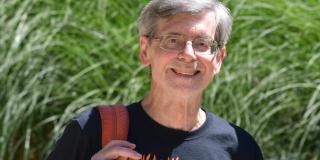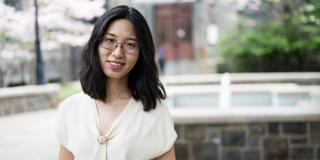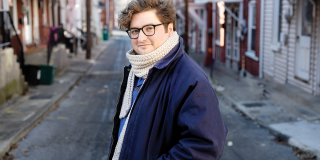The Anatomy of Law
From lab to moot court, Michael A. Epstein, ’75 took the legal path after Lehigh
Michael A. Epstein ’75 was interested in science and thought perhaps medicine was his calling, but he is living proof that one’s major does not limit one’s career choices. Given his distinguished legal career, it is rather surprising that law was not his clear first choice.
“I was very interested in biology and wanted to keep open the possibility of pursuing a career in medicine,” says Epstein. “To preserve the option of medical school, and taking into account all of the science course requirements that medical schools had in those days, I chose to major in biology.”
His curiosity in science was balanced by an interest in law, and a biology major helped him, when he ultimately decided to apply to the law school. “Being one of only a limited number of individuals applying to law school with a major in biology gave me a bit of an advantage over other candidates, say Epstein, who received a Juris Doctorate degree from New York University.”
Epstein is a senior partner and member of the corporate leadership team at the international law firm Weil, Gotshal & Manges, where he has worked for 35 years and practices in the firm’s New York City office. He also chairs the firm’s Technology and Intellectual Property Transactions Practice Group. His transactional work includes structuring and negotiating technology and intellectual property acquisitions, technology transfer and licensing arrangements, outsourcing transactions and joint ventures. He also has extensive intellectual property litigation experience, including handling technology-related disputes and litigations involving non-compete agreements.
“I was lucky,” Epstein says. “Lehigh provided me a great background in technology-related subjects. When I first started practicing, technology law was just taking off. I saw an opportunity and participated as the legal profession developed specialty areas such as computer law, biotech law, and internet and e-commerce law.”
Epstein’s expertise strengthened Weil’s reputation in these areas as the firm—approximately 100 lawyers today--focused on technology and intellectual property matters. In January 2014, the firm was recognized by the renowned Law360 as having one of the top practices nationally in technology and intellectual property.
“My legal practice primarily involves representing companies engaged in technology-related transactions,” explains Epstein. “Among other companies, I represent a number of large pharmaceutical companies as well as entities in the computer and social networking sectors. My background as a biology major, and the natural sciences courses that I took at Lehigh, have been extraordinarily valuable to me as I practice law in this area. I understand the business issues, the technology issues, as well as the legal issues, which gives me an advantage over other lawyers.”
Epstein recalls one of earliest major cases on which he worked. It involved a dispute between his firm’s client, the Paris-based Institut Pasteur, and the U.S. Government’s National Institutes of Health (NIH) over whether the human immunodeficiency virus, or HIV, was first discovered at Pasteur or at NIH. Dr. Jonas Salk helped mediate a settlement between the two sides and during the process Epstein and Salk developed a friendship.
“There is no doubt that my biology training at Lehigh played a large role in allowing me to have insight into the dispute and the ability to both represent Pasteur effectively and deal directly with the scientists and Dr. Salk.”
Epstein proudly notes that after the dispute settled, the Nobel Prize in Medicine was awarded to his clients. Shortly thereafter, Epstein was asked by Salk to join the Board of Trustees of the Jonas Salk Foundation, of which he is still a member today.
Epstein says he chose Lehigh because of its small, private school feel and the wide variety of liberal arts courses it offered. He also wanted a school within a few hours from home in New York City.
“I was able to take a reasonable amount of courses outside of my major and outside of the natural sciences, giving me the opportunity to sample courses in international relations, philosophy, sociology and religion. I also developed my written and oral communication skills, which are vital for success.”
In addition to the educational aspect of Lehigh, Epstein was very involved in the Forum, the student-faculty-administration governing body that existed at the time. In his senior year, he was vice-chair of the Research Committee, a standing committee of the Forum, which was a leadership position and an executive committee position.
When looking back on university life, Epstein recalls one of his most meaningful academic experiences — conducting microbiology research during his senior year with biology professor Steven Krawiec.
“It was a fantastic experience. I learned so much and got to know Professor Krawiec well. When the Development Office approached me about the possibility of funding research in the Biology Department, I was able to identify with the request in a very positive way because of my experience, and I knew that I would be helping Lehigh students attain an educational experience similar to mine.”
Philanthropy has always been a meaningful part of Epstein’s life. He thanks his parents for instilling the importance of giving back to others. “Dollars were not abundant in my house when I was growing up. Despite this, my parents always made me aware that I am lucky compared to many others. They taught me that even though our family budget may have been tight, we always had to find a way to give some amount of money to charity.”
Epstein’s philanthropic efforts go beyond Lehigh. He is involved in a number of not-for-profit boards including serving on the Board of Trustees and Executive Committee of the North Shore-LIJ Health System and as vice-chair of the Board of Trustees of the Feinstein Institute for Medical Research. “Involvement in these two boards allows me to maintain my interest in biology and medicine,” he says.
Epstein also serves on the Board of Trustees and Executive Committee of the Jewish Board of Family and Children’s Services, one of the largest social service not-for-profit organizations in the country. He has served on advisory panels to Congress and to the National Academy of Sciences, Institute of Medicine on intellectual property matters. He is the author of more than 60 articles on intellectual property law and has lectured around the world on such topics as trade secrets, biotechnology law, trademark law, computer law, cybersecurity and e-commerce. He is a founder and co-editor of Intellectual Property & Technology Law Journal and a member of the Editorial Boards of Computer Lawyer, Intellectual Property Strategist and Cyberspace Lawyer. He is also the author of the treatise Epstein on Intellectual Property and co-editor of Drafting License Agreements.
Epstein continues to show his appreciation for the university by recommending the school to students preparing to enter college.
“The school provides a top flight educational experience coupled with terrific extracurricular activities. As a member of the Dean’s Advisory Council for the College of Arts and Sciences, I have been able to meet with faculty and administration, and they have always exhibited a deep sense of caring and commitment for making the Lehigh experience a truly positive one for every student.”
Epstein and his wife Lisa have three children – a son Jesse, 17, a daughter Emily, 15, and a son Eric, 11. They call Long Island, New York home.
Leslie Feldman







